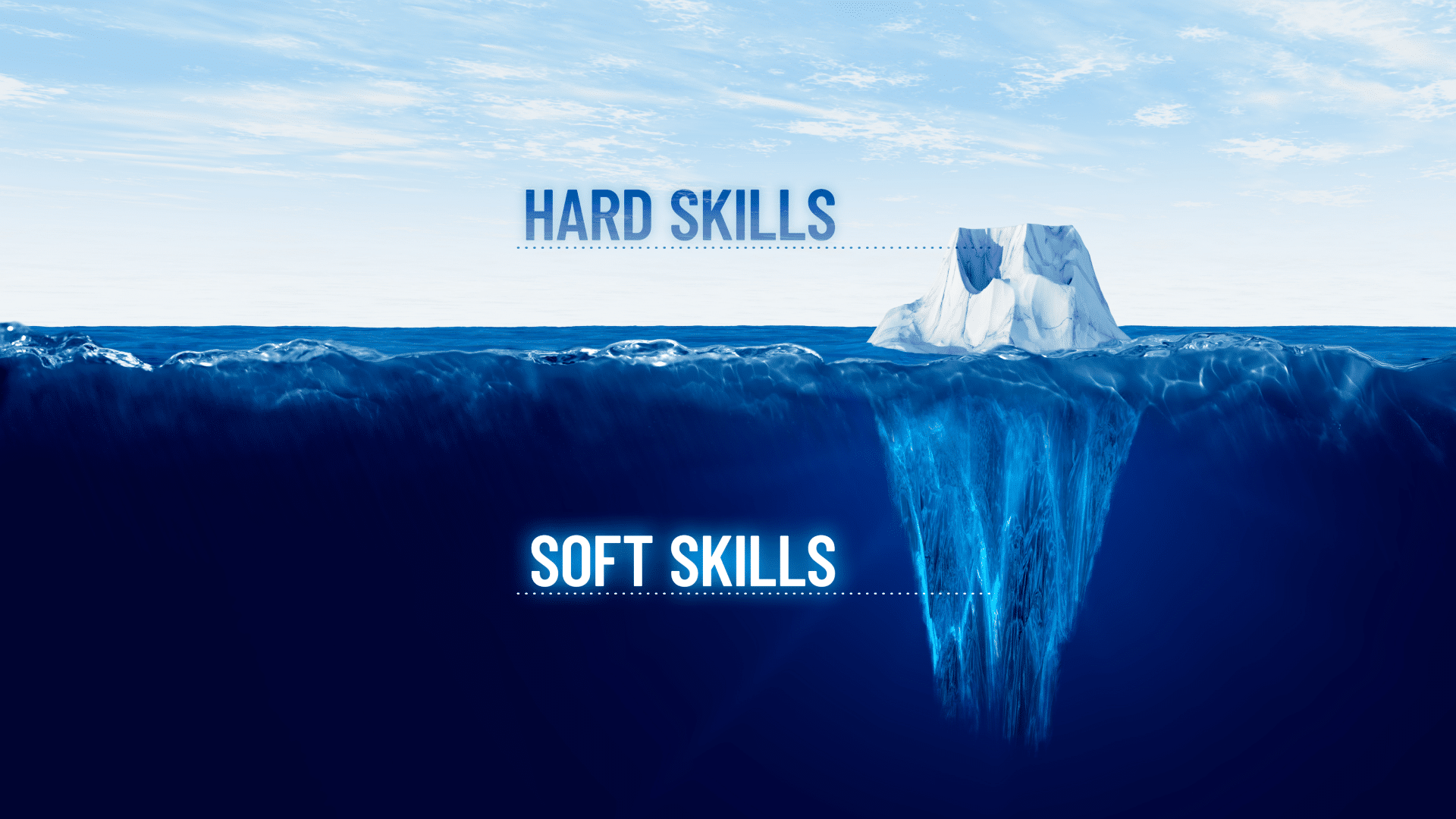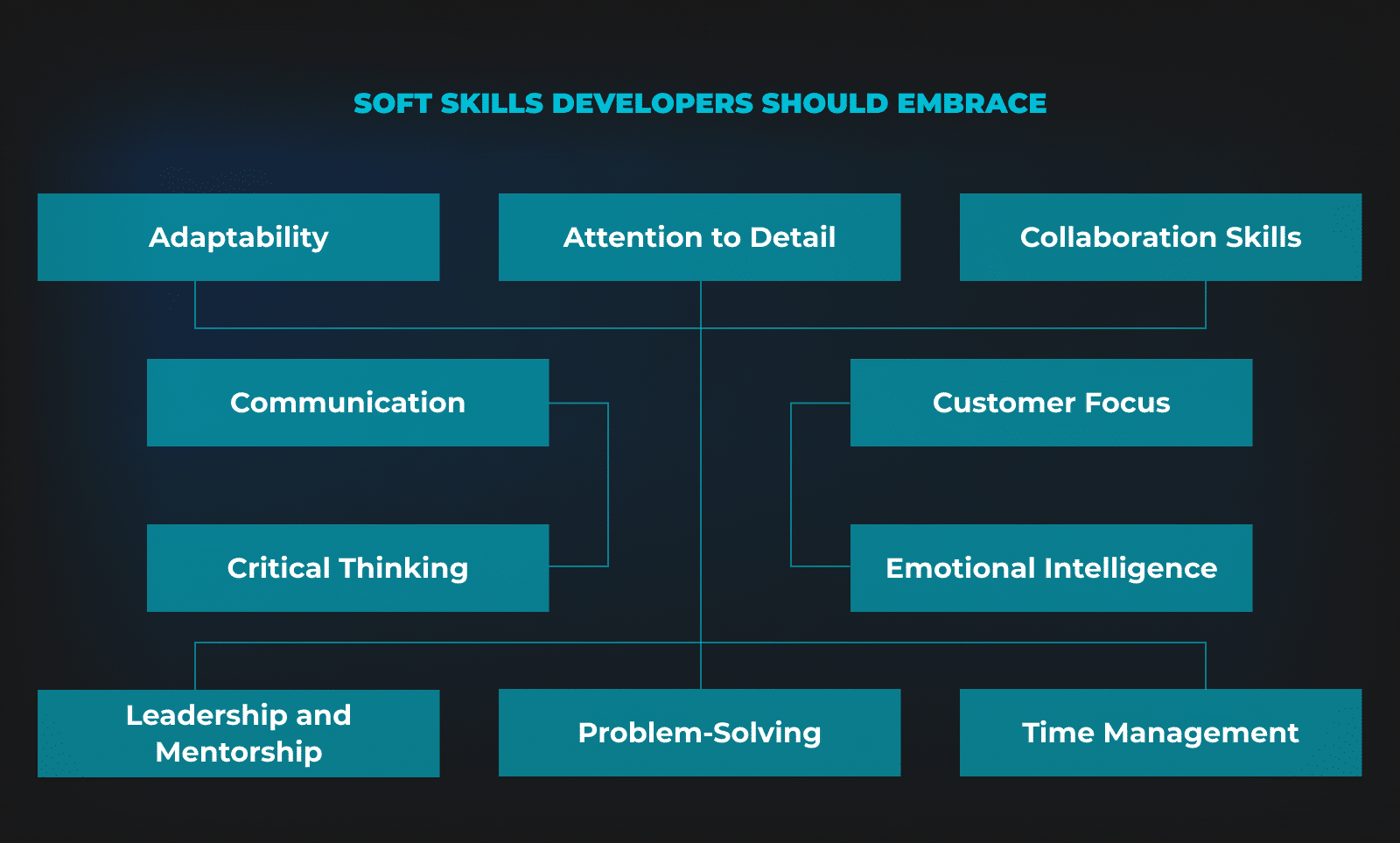Critical Soft Skills For Software Developers To Check on An Interview
Recent research shows that over the last two years, 77% of job listings in the USA required candidates to have at least one ‘durable skill’. Often referred to as ‘soft skills’, these include social abilities like creative thinking, emotional intelligence, and teamwork. Such skills are valued by employers as they enable employees to interact effectively with others. They play a vital role in our capacity to communicate, collaborate, and solve problems.

So, you may ask, what are the most important software developer soft skills? How can HR professionals check for them during interviews? Let’s explore this in this guide.
Soft Skills Developers Should Embrace
Here are some of the top soft skills hiring teams consider when seeking to hire a developer.

Adaptability
Adaptability is crucial for software developers. The software world is always evolving, with new tech and languages popping up fast. Being adaptable means welcoming change, swiftly learning, and adjusting to new tools and methods. This skill demonstrates a developer’s knack for staying current and making meaningful contributions to their team. Graduate Careers website Prospects listed adaptability as one of the top skills employers look for when hiring.
Identifying an adaptable software developer is easy when considering these key traits:
- Quick Learner: Adaptable developers swiftly grasp new concepts, languages, and frameworks. They actively seek fresh information to stay up-to-date.
- Tech Versatility: Adaptable developers possess diverse skills, effortlessly working with various languages, frameworks, and tools. They seamlessly switch between front-end and back-end development and adapt to different technology stacks.
- Handling Ambiguity: Excelling in situations with unclear or changing requirements, adaptable developers maintain effective work even amid ambiguity.
- Agile Proficiency: Adaptable developers are familiar with agile methodologies. They thrive in environments that emphasize iterative development, frequent feedback, and continuous improvement.
- Embracing Change: They willingly try new approaches and technologies, showcasing adaptability across legacy and newer projects. Importantly, they do so without a strong attachment to specific methods or tools.
Attention to Detail
In software development, attention to detail is crucial. Overlooking even a small detail can have serious consequences. To excel, developers must meticulously handle every aspect of the code, thoroughly understand requirements, and ensure flawless software functionality. This precision results in high-quality code that meets client expectations. According to the 2023 Global Skills Taxonomy by the World Economic Forum, attention to detail ranks as the 7th most crucial core skill for workers.
To gauge a software developer’s attention to detail, consider the following aspects:
- Code Quality: Check previous code or request a sample. Look for well-organized, cleanly written code with proper structure and formatting as it indicates meticulous attention to detail.
- Error Handling: Evaluate the error-handling mechanisms in their code. A developer who anticipates and addresses potential issues, demonstrates a detail-oriented approach.
- Documentation: Examine code documentation for clear comments, function explanations, and comprehensive information. Thorough documentation reflects a developer’s attention to detail.
- Testing Practices: Ask about their testing methods, including unit and integration testing. Detail-oriented developers prioritize testing to ensure the functionality of their code.
- Consistency in Style: Check for a consistent coding style, including formatting and variable naming. Meticulous developers adhere to a uniform style across their work.
Collaboration Skills
Effective collaboration is one of the most crucial soft skills for software engineers. How developers engage with colleagues, project managers, and clients directly affects outcomes. Enhancing collaboration skills enables developers to work smoothly, handle conflicts positively, and create a favorable team environment. About 75% of employers consider teamwork and collaboration as “very important, and crucial for success at work.
Here’s how to assess a software developer’s collaboration skills:
- Team Projects: Inquire about their experience in team projects. Learn about their role and contributions.
- Communication Skills: Evaluate their ability to express ideas and ask questions, both spoken and written.
- Code Reviews: Look for active participation and value placed on code reviews. Do they join in assessing code quality and adherence to standards?
- Open Source Contributions: Participation in open source projects signals strong collaboration. It shows they can work with diverse developers and contribute seamlessly.
- Teamwork Attitude: Evaluate their attitude towards teamwork. Consider their willingness to help, share knowledge, and contribute to team success.
- Project Management Tools: Verify competence with tools like Jira and Trello. This demonstrates their capacity to function effectively in a group setting.
Communication
Effective communication is another of the more important soft skills developer should embrace. According to a 2023 Harris Poll sponsored by Grammarly, 72% of business leaders believe that it enhances team productivity. Prioritizing clear communication helps developers build strong connections, avoid misunderstandings, and ensure project success.
To assess a software developer’s communication skills, consider the following:
- Clear Documentation: Check code documentation for clarity and conciseness. Assess code comments, README files, and other documentation.
- Effective Email Communication: Evaluate the ability to communicate complex technical information. Look for well-structured, to-the-point emails.
- Participation in Meetings: Assess active contribution in team meetings. Look for relevant questions, valuable insights, and clear expression of ideas.
- Explanations to Non-Technical Stakeholders: Verify ability to explain technical concepts to non-technical team members. This is important for liaising with project managers, clients, etc.
- Problem-Solving Discussions: Assess ability to articulate thoughts, listen to alternatives, and collaborate on solutions, especially when engaged in technical discussions.
- Empathy and Active Listening: Observe interactions with colleagues. Good communicators are good listeners, showing empathy and understanding of team concerns.
Critical Thinking
Embracing critical thinking is crucial for software developers. It means objectively analyzing information, gathering evidence, and making informed decisions. In the complex world of software development, critical thinking helps identify root causes, consider diverse perspectives, and propose effective solutions. By 2025, critical thinking will be one of the most in-demand skills, according to the WEF.
So how do you access critical thinking skills as a software developer?
- Problem-solving: A skilled developer breaks down problems, spots connections, and devises creative solutions.
- Prioritization: Efficient task prioritization and time management signal strong critical thinking skills in a developer.
- Open-mindedness: Critical thinkers stay flexible, exploring alternative solutions and approaches instead of rigidly sticking to one method.
Customer Focus
Creating software is all about making products or services that meet users’ needs. To achieve this, developers must truly grasp their audience and their needs. This is where customer focus comes in, allowing developers to craft software that is easy to use, intuitive, and delivers an outstanding user experience.
Putting customers first is crucial for success and companies that prioritize their customers are 60% more profitable than those that don’t.
To evaluate a software developer’s customer-focus skills, consider the following:
- User-Centric Design: Check for user-centric design principles like personas, usability testing, and user feedback.
- Empathy: Look for instances of understanding and addressing user pain points and challenges.
- Customer Feedback Integration: Seek evidence of actively incorporating user feedback into the development process.
- Usability Testing Participation: Inquire about involvement in usability testing and its impact on improving software.
- Continuous Learning: Ask about proactive efforts in learning new technologies to better meet user needs.
- Responsiveness to Support Issues: Examine prompt and effective resolution of customer support issues post-release.
Emotional Intelligence
One of the best soft skills for software engineer to embrace is emotional intelligence. This skill is vital for fostering positive relationships, enhancing teamwork, and resolving conflicts efficiently. Research indicates that 58% of job performance relies on emotional intelligence. Developers with high emotional intelligence build better work connections, leading to successful projects and boosting team morale.
An emotionally intelligent software engineer will:
- Active Listening: Listen carefully, avoid interruptions, and acknowledge others’ opinions before responding.
- Supportive Teamwork: Actively back up team members, celebrate successes, and offer help during challenges.
- Handling Change: Adapt smoothly to dynamic software development, managing evolving requirements, technologies, and team dynamics without letting stress impact work.
- Constructive Feedback: Provide respectful feedback, focusing on issues rather than personal criticism, creating a comfortable feedback environment.
- Managing Disagreements: Approach conflicts with a solution-oriented mindset, engage in healthy discussions, and find compromises for the team and project’s benefit.
- Self Awareness: Is aware of personal emotions, understanding their impact on work and relationships, allowing for better management and informed decision-making.
- Handling Pressure: Manages stress effectively during tight deadlines or challenging projects, maintaining a positive attitude without negatively affecting work or team dynamics.
Leadership and Mentorship
Leadership and mentorship are critical skills for software engineer to learn. It helps them guide the next-gen experts and boosts team success. In interviews, evaluating these skills gives insight into collaboration, teamwork, and creating a positive workplace. Over 52% of employers seek these skills when hiring.
When assessing leadership and mentorship skills, consider the following:
- Team Dynamics: Gauge awareness of team dynamics and the ability to empathize with team members. Strong leaders are attuned to team emotions.
- Conflict Resolution: Evaluate their approach to resolving team conflicts constructively. Skilled leaders navigate disagreements and promote collaboration.
- Delegating Tasks: Assess ability to delegate tasks, recognizing team members’ strengths.
- Setting Clear Goals: Determine skill in setting achievable goals for the team and individuals. Goals should align with project objectives and team members’ professional development.
- Tracking Progress: Evaluate the approach to tracking and measuring progress. Good leaders regularly assess performance, provide feedback, and support individuals in achieving objectives.
Problem-Solving
In the software development industry, problem-solving is vital and one of the most critical soft skills engineering requirements that headhunters seek. Developers face complex issues regularly, requiring critical and analytical thinking for success. By refining these skills, developers enhance their ability to find efficient and innovative solutions, leading to greater project success. At least, 88.7% of employers look for problem-solving skills when recruiting.
When evaluating problem-solving skills in software developers, consider these key points:
- Creativity and Innovation: Check for a unique and innovative problem-solving approach in candidates.
- Adaptability: Assess how well candidates handle changes and unexpected challenges. Ask about instances where they adapted for positive outcomes.
- Timed Assessments: Introduce time constraints to evaluate real-world decision-making under pressure. Assess candidates’ ability to prioritize tasks and find efficient solutions.
- Persistence and Resilience: Inquire about experiences with setbacks and how candidates learned from failures. Look for a commitment to finding solutions despite obstacles.
Time Management
For a career in computer science, the ability to manage time is essential. Developers manage several projects with short deadlines in this fast-paced field. Their ability to prioritize work, make effective use of their time, and regularly fulfill deadlines is enhanced by good time management. This skill not only enhances output by 90% but also reduces stress levels by 91%.
Assess a software developer’s time management by focusing on these aspects:
- Project Planning: Look for well-thought-out project plans, precise time estimates, achievable timelines, and the skill to prioritize tasks based on importance and urgency.
- Task Completion: Check if the developer consistently meets deadlines, and handles multiple tasks while maintaining quality.
- Time Tracking: Evaluate the use of time tracking tools and the accuracy of time estimates.
- Adaptability: Consider how well the developer adapts to changes and effectively reprioritizes tasks.
- Milestones: Examine the setting of milestones and deadlines, seeking a structured approach to project scheduling and effectively separating projects into manageable chunks.
In software development, technical skills are vital, but soft skills are just as important. When hiring, focus on both to ensure you get developers who excel technically and adapt well to the dynamic environment, boosting project success.
Build an exceptional software project team with Newxel. We not only identify top developers but also streamline the candidate selection process, saving you time and effort.
How Newxel Can Help Evaluate Developers
Evaluating both hard skills and soft skills for software developer can be a tedious process, taking time and attention away from other business aspects. While leveraging emerging technologies like AI-powered recruitment streamlines things, partnering with a reliable firm like Newxel is the best idea. It helps build a team with the perfect mix of hard and soft skills, saving time and resources.
As a leading global IT staffing company, Newxel specializes in building IT teams and establishing R&D centers worldwide. Our comprehensive solution streamlines developer evaluation. We handle pre-screening and interviews, presenting you with candidates that seamlessly align with your project requirements. Whether you need just one back-end developer, a mix of IT experts, or a dedicated team, we can take the burden of candidate selection off your shoulders.
Contact us.
Conclusion
Hiring people with the right qualifications, experience, and tech background matters. But beyond technical proficiency, giving priority to software developer skills such as communication, problem-solving, teamwork, and adaptability when hiring ensures a well-rounded and effective development workforce. This approach ultimately contributes to the success of projects and fosters a positive work environment.





